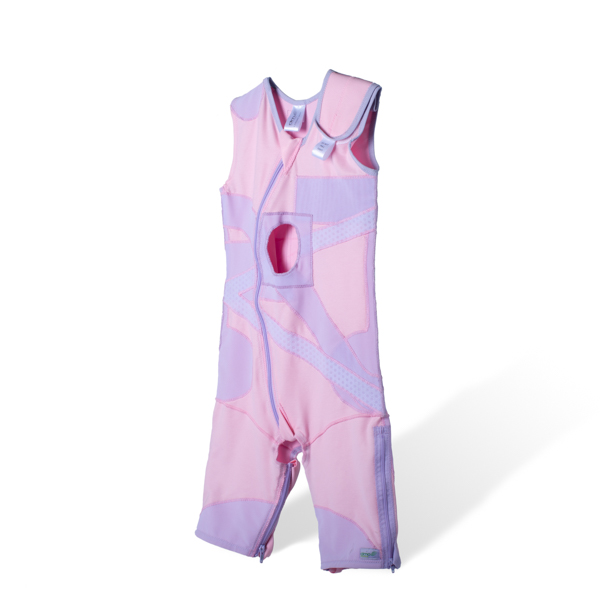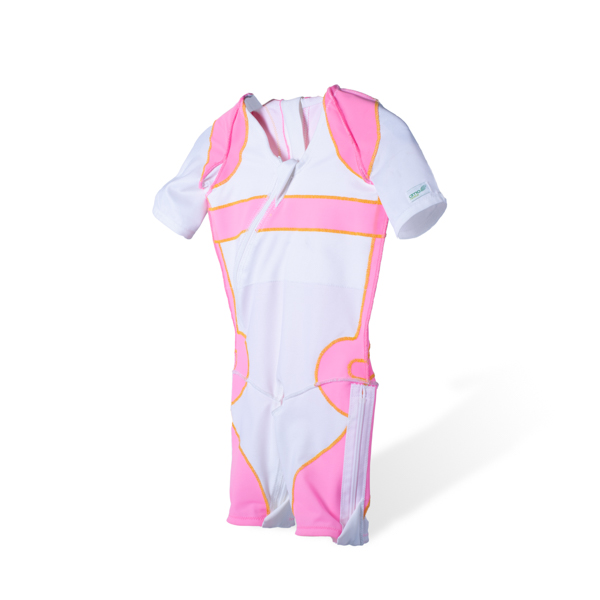Dynamic Movement orthoses or Lycra garments/suits have been used in orthotic treatments for more than 10 years, but it was only recently that a reliable company providing high-quality innovative suits emerged – DM Orthotics Ltd. Their Dynamic Movement orthosis is designed to apply a global compression to the joint and body segment that it is worn over. This compression acts to increase the client’s awareness of that part of the body, a process called proprioception.
The suits are made from complex panels of Lycra that compress over specific muscle groups. Detailed measurements are needed of the client’s body in order to manufacture the suit. In addition to the Lycra, we can add elasticated panels to add a biomechanical effect to specific areas of the suit. The elasticated panels allow us to gain control of postural problems, such as protracted shoulders, kyphotic posture or internally rotated limbs.

With increased proprioception, a person can often control that part of the body more effectively. With increased proprioception to the trunk, balance and posture can be significantly improved.
Dynamic Movement orthoses can be beneficial in treating many different types of neurological dysfunction found in Cerebral Palsy, Brain Injury, Multiple Sclerosis, and other neurological conditions.
Compliance is key to the success of this orthosis, the suits are designed to be very close fitting. In our experience, the functional benefits outweigh any comfort issues.

We have the following facilities and amenities at our Kingston Upon Thames location:
We also have the Gait Laboratory for orthotics patients and Onsite Manufacturing for speedy turnarounds and adjustments whilst you wait.
An insole is a contoured orthotic device which alters the characteristics and biomechanics of the foot and ankle area. Biomechanics are concerned with mechanical laws and how they affect the living body, especially the musculoskeletal system.
They are removable devices, often made from plastic, that are designed to fit inside a shoe to provide additional support for your feet. As well as offering shock absorption, an insole can help distribute the weight of your body more effectively across the foot and can be made bespoke to cover a range of biomechanical conditions.
If you have symptoms in your feet, ankles, hips or your lower back that are intermittent or were not there to start with in early life, and have started to cause you pain over a period of time, bespoke orthotic insoles could be an excellent option.
If you have already tried rest, icing, compression and elevation and your feet have not recovered, we recommend a biomechanical assessment to consider the possibility of insoles. They are a non-invasive approach to treatment and in many cases, are a great option for symptoms that are not severe enough to warrant surgical intervention. Alternatively, they can be considered as an option prior to surgery.
We will send patients away when an insole is not appropriate, if a patient is suffering with iliotibial band syndrome for example, the problem can be helped with physiotherapy and a stretching programme. That’s what our biomechanical assessment is all about; determining whether there would be any benefit from altering the alignment of your feet.

“It’s life-changing, my swimming coach has even remarked what a difference my treatment has made" Read how pectus bracing treatment helped to correct Aris' complex chest deformity, involving a combination of pectus excavatum, pectus carinatum and rib flaring.

Cerebral palsy patient Lucas sees significant improvement in his walking after only six months in his new custom Ankle Foot Orthoses (AFOs), designed by Professor Saeed Forghany in our Manchester clinic. Hear how a detailed gait analysis and bespoke AFOs significantly improved Lucas's gait and comfort.

Freddie’s positional plagiocephaly was treated successfully with the LOCBand Lite, going from 11mm to 2mm after four months in his helmet.

Adult club foot (talipes) patient Natasha says, "I cannot stress how amazing my AFOs are and how they have changed so much for me. The support they give me allows me to walk without crutches outside the house for the first time in over fifteen years."

Diagnosed with adolescent idiopathic scoliosis at 14 years old, Polly and mum Zoe looked to the LOC Scoliosis Brace to help her curve and avoid surgery at a later date.

LOC opens its first clinic in Northern Ireland, LOC Belfast, offer non-surgical orthotic treatment for scoliosis, pectus carinatum and pectus excavatum. Here, we will also be able to provide orthotic treatments for a range of adult and paediatric lower limb conditions including cerebral palsy, spina bifida, hypermobility, stroke, post-polio syndrome, and multiple sclerosis.

Mum Natalie shares her experience of having both her identical twins diagnosed with craniosynostosis. Ella and Nina had surgery at Great Ormond Street Hospital before going through cranial remoulding therapy at the London Orthotic Consultancy.

See how a thorough gait analysis and a correctly-fitted, bespoke Reciprocating Gait Orthosis (RGO) helped Ted, a spinal surgery and cancer survivor, improve his rehabilitation and mobility goals, getting him back on his feet again.